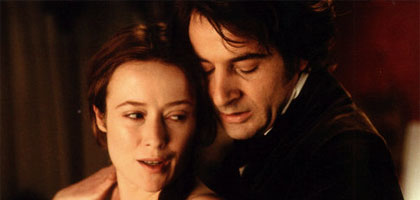
Possession
USA/UK 2002

Reviewed by Charlotte O'Sullivan
Synopsis
Our synopses give away the plot in full, including surprise twists.
Roland Michell (Aaron Eckhart), an impoverished US academic working in present-day London, discovers a letter which sheds light on the life of Victorian writer Randolph Ash (Jeremy Northam). Apparently happily married, Ash, it turns out, was obsessed by the poet Christabel LaMotte (Jennifer Ehle). Roland shares this insight with feminist scholar Dr Maud Bailey (Gwyneth Paltrow), who is Christabel's great- great-great grandniece. They go to Christabel's family home, where they find love letters exchanged by the writers. Meanwhile a number of rival scholars have realised that the pair are on to something. Maud and Roland retrace Ash and LaMotte's journey to Whitby, hoping to flnd out what became of the relationship. In the meantime their rivals try to buy the love letters from Christabel's family, then decide to go off to France on a new trail. Maud and Roland beat them to it. They discover that Christabel became pregnant, but that the baby mysteriously disappeared and that Ash believed she'd killed it.
Ash was buried with a box containing an unopened letter from Christabel. Back in England, Maud and Roland find out that the other academics plan to rob Ash's grave. There's a confrontation at the cemetery. Roland and Maud open the box and realise that Christabel's child was brought up as her niece, which makes Maud the great-great-great granddaughter of Christabel and Ash. A blonde plait in the box reveals that Ash met his daughter as a little girl.
Review
Neil LaBute is great at hate. In his three previous features (In the Company of Men, Your Friends & Neighbors and Nurse Betty), falling in love is generally a big mistake, and the assertion of independence both safe and thrilling. You wonder, then, what possessed him to adapt A.S. Byatt's novel, because for all that book's deconstructive wit, what it celebrates is the attempt to share. Love isn't easy for either of its central couples - whether the Victorian poets Randolph Ash and Christabel LaMotte, or the present-day academics obsessed with them, Roland Michell and Maud Bailey - but it's a risk worth taking. The irony is that LaBute (revising a screenplay by Laura Jones) has added syrup to the romances and drained out the danger. The result? A film that's faithful neither to Byatt's vision nor to his own.
Byatt's novel, among other things, challenges our beloved notion that the Victorians were sexually repressed and 'we' are uninhibited. But the film restores the status quo. Take the scenes in Whitby, where both couples end up staying in the same hotel. In the book, Christabel prepares for sex by getting into bed in her nightie; having made love to her, Ash realises that, despite her virginity, she was already sexually experienced, thanks presumably to her live-in companion Blanche. In the film, a masterful, excited Ash slowly unloosens Christabel's corset - shorthand for her lust being unlocked for the very flrst time. Meanwhile Maud and Roland, who in the book bond chastely over their love of single 'virginal' beds, now share a double at the hotel because of a mix-up. Needless to say, sexual tension ensues.
The worst betrayal, however, concerns the character of Roland himself. Byatt's dark, British smudge of a loser is lower class, stuck in a rut of academic mediocrity, friendless, chained to a bitter girlfriend and oppressed by a horrible landlady. In other words, he is everything Maud - beautiful, upper-class and critically lauded - is not. In the movie though Roland has become an attractive, confident Yank (played by LaBute regular Aaron Eckhart) who's determined to stay single because his "antics" hurt someone in the past (subtext: he's a heartbreaker!). He's also a man of action, solving the historical puzzle by stripping off, Mr Darcy style, and diving into a lake. The character, in effect, has been bumped up the Darwinian chain, thus undermining one of the central points of the story, which is that in the present day it's possible for a man to feel completely inferior to a woman: Roland is to Maud as Christabel was to Ash. Just as importantly, this undermines the idea that a woman could be drawn to such a 'weak' flgure. Instead, the film promotes the age-old idea that what women want is a man who knows what he wants.
On the other end of this equation is Maud, who should be the film's trump card. Gwyneth Paltrow is just right as a woman resigned to her perfections, but LaBute doesn't want his heroine to be too much in control, so he's given her a heap of neurotic ticks. She frets over the state of her relationship with Roland like a common-or-garden Bridget Jones. One woman, though, does escape the film's dead hand. Blanche is the painter/lover/friend Christabel leaves behind, and Lena Headey plays her to perfection. Neither a repressed Mrs Danvers flgure nor a moppet, she has hardly any lines, but her face says everything about what it means to be rejected. When Blanche drowns herself, her walk into the lake is filmed in a smoky blue light. She has given up on romance in life; all her creativity and sensuality are being poured into death.
Meanwhile Jennifer Ehle's Christabel, who's been merely arch and simpering up to this point, also gets a chance to shine as a result of the tragedy. She and Ash meet at a séance where she screams, "You have made a murderess of me!" It's a horrifying moment (Ash thinks she's talking about their child). And maybe that's what got LaBute excited. You believe in Christabel's desire to hurt Ash; you can even believe that she did kill her child. This is the one point where the film and book chime. Byatt uses up a lot of words to convey the cold madness Christabel is plunged into when she travels to France to have her baby; Ehle's pinched face gets you there in an instant.
The modern scenes, by comparison, are constantly disappointing. Indeed, they get positively farcical. Maud and Roland's declarations of love at her flat ("I want to know if there's an us in you and me"); the gathering of the forces for good to defeat the wicked American academic Cropper; the fist-flght in the cemetery... It's almost impossible to believe LaBute was in the building when these scenes were shot.
But maybe there's method to this madness. Throughout Possession, the usually subtle Eckhart wears a permanent 'aren't-I-cute?' grin. We recognise the look: it's the same one he wore for In the Company of Men. Did LaBute wish to suggest that Roland's fairytale virtue was just that - too good to be true? Maybe LaBute originally planned a cemetery scene in which pushy Roland reveals he's been on Cropper's side all along. Ridiculous? At least this scenario would have had a demonic energy. The one LaBute has plumped for has no life at all.
Credits
- Director
- Neil LaBute
- Producers
- Paula Weinstein Barry Levinson
- Screenplay
- David Henry Hwang Laura Jones Neil LaBute
- Based on the novel by
- A.S. Byatt
- Director of Photography
- Jean Yves Escoffler
- Editor
- Claire Simpson
- Production Designer
- Luciana Arrighi
- Music
- Gabriel Yared
